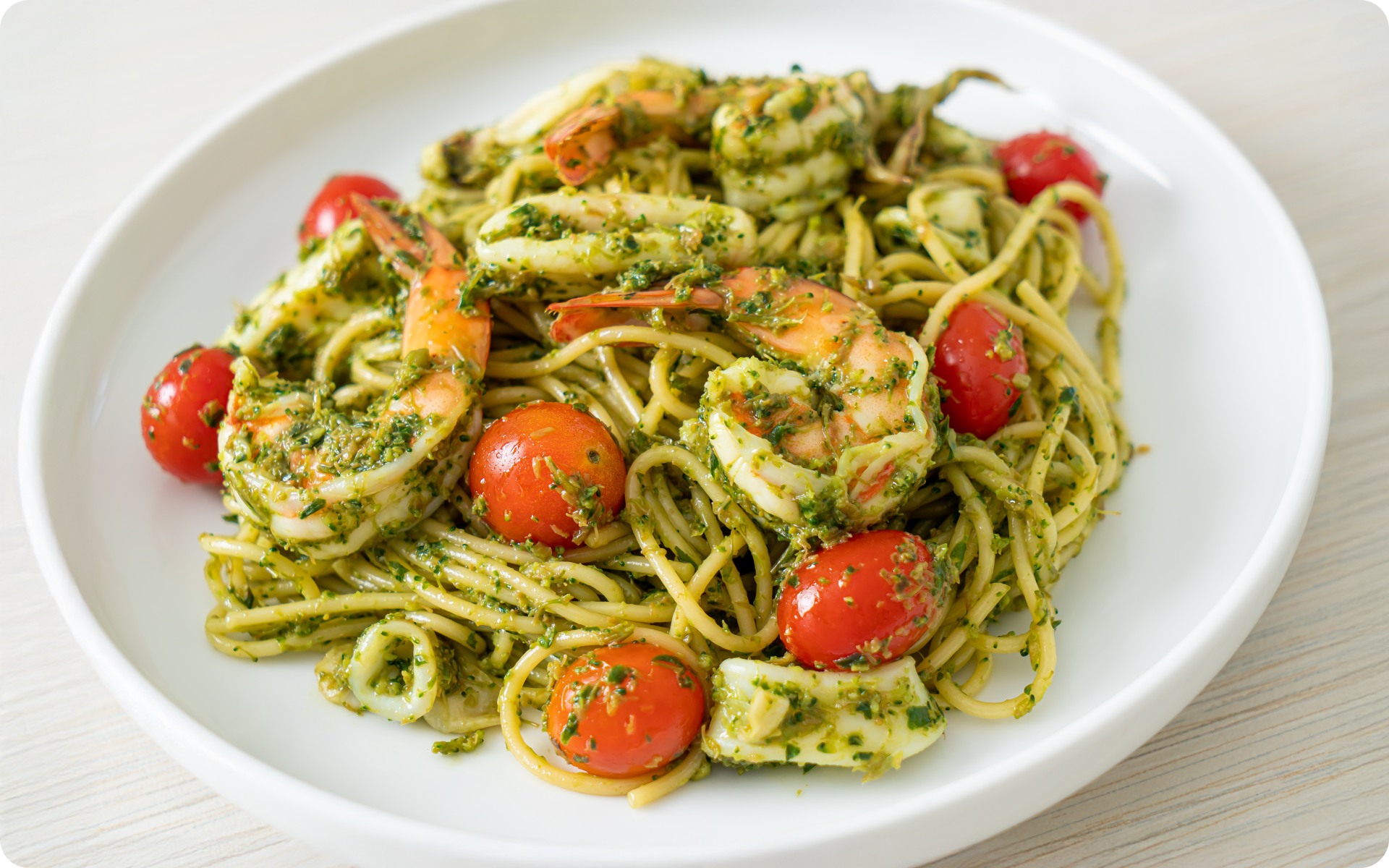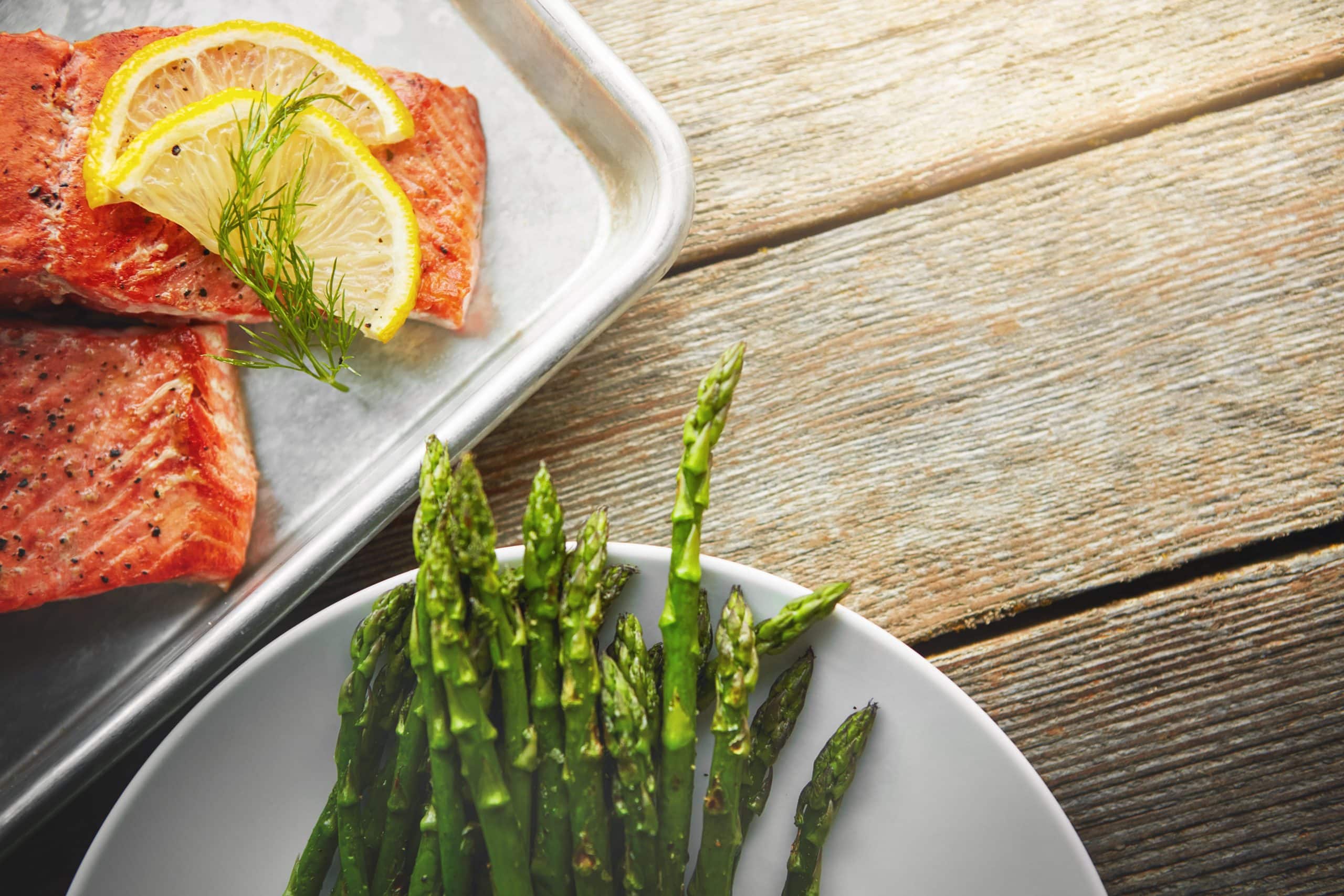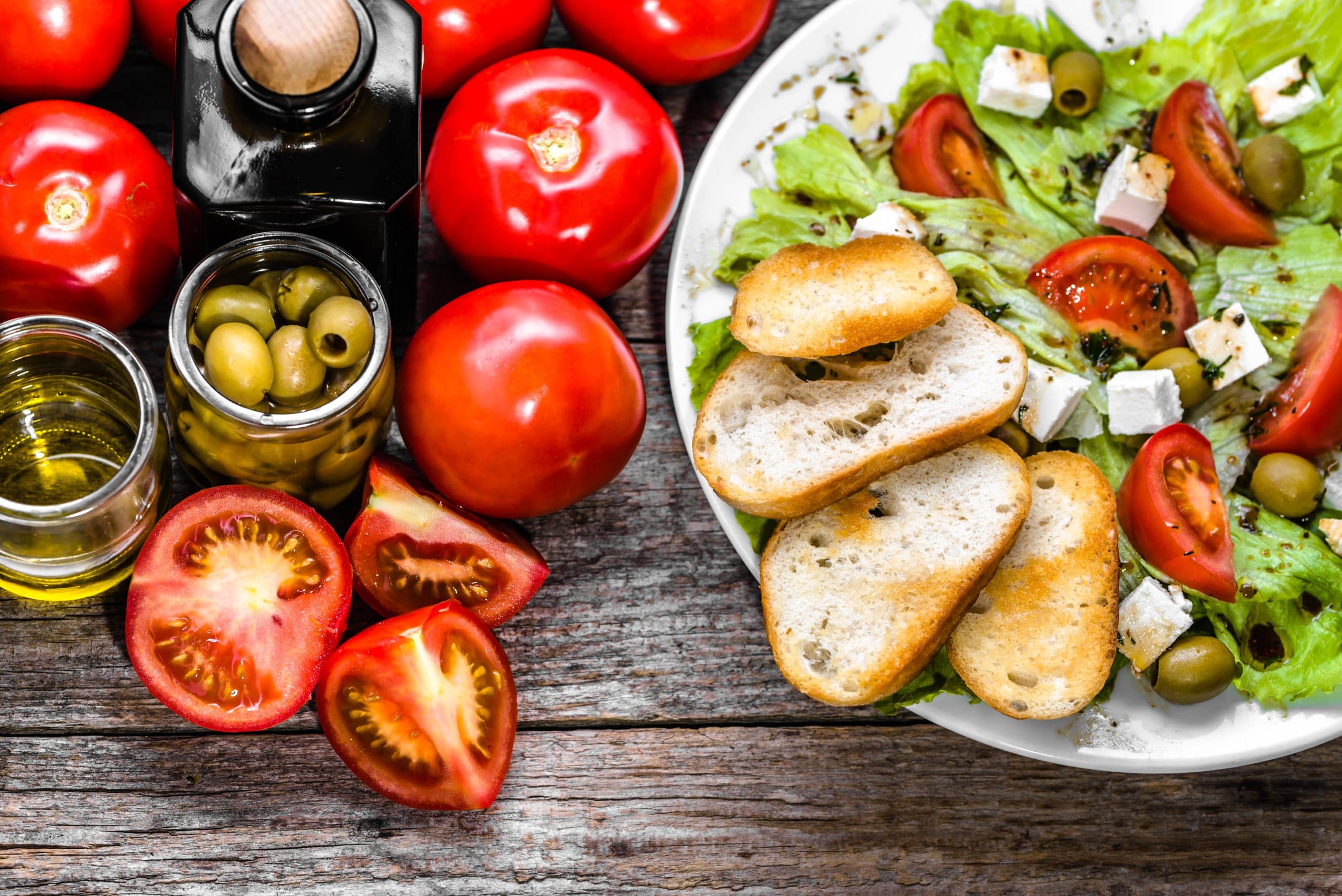What Is the Mediterranean Diet?
Imagine a diet that doesn’t feel like a diet — a culinary adventure that tantalizes your taste buds while safeguarding your health. Welcome to the world of the Mediterranean diet, where every meal is a celebration of vibrant flavors and wholesome goodness. Originating from the sun-drenched shores of Greece, Italy, Spain, and other Mediterranean countries, this ancient, timeless way of eating has captured the hearts and palates of food enthusiasts all over the world.
It’s more than just a collection of recipes — it’s a lifestyle steeped in tradition and brimming with health benefits. The diet is a great mix of plant-based meals, fish, grains, lifestyle, and recipes, rich in plant proteins, healthy fats, and fiber. However, it has a low amount of saturated fats, added sugar, dairy products, and meat. That is why it’s a wonderful balanced nutrition plan.
Join us as we delve into the depths of this Mediterranean treasure trove, uncovering its secrets to longevity, vitality, and sheer culinary delight. From the allure of olive oil to the charm of fresh seafood, we’ll navigate the seas of nutrition and flavor, setting sail on a voyage toward a healthier, more delicious way of living. Welcome aboard!
Health Benefits of the Mediterranean Diet
This diet is flexible, delicious, and easy to follow, reflecting the traditional eating habits of people who live in countries that border the Mediterranean Sea. For the most part, it emphasizes fresh vegetables, fruits and herbs.
Learn about the ancient-inspired wisdom of the paleo diet and discover its potential benefits for modern-day wellness.
It is also common to use olive oil instead of butter, and eat a lot of whole grains and pulses, and it is popular to have a glass of good red wine with your family and friends during dinner. The Mediterranean food plan may positively affect your physical and mental well-being. It is associated with a decreased risk of heart disease, Alzheimer’s, and Parkinson’s (5, 7, 10).
The diet has been extensively studied and found to offer numerous health benefits. Its key advantages include:
- Reduced risk of heart disease and stroke.
- Lower incidence of hypertension (high blood pressure).
- Improved lipid profile, including higher levels of HDL (good) cholesterol and lower levels of LDL (bad) cholesterol.
- Lower incidence of certain cancers, including breast and colorectal cancer.
- Improved cognitive function and reduced risk of Alzheimer’s disease.
- Better weight management and lower risk of obesity.
- Anti-inflammatory effects, which may help mitigate chronic inflammation associated with various diseases.
- Improved gut health due to high intake of fiber-rich foods such as fruits, vegetables, and whole grains.
- Reduced oxidative stress and improved antioxidant status, thanks to the abundance of fruits, vegetables, and olive oil in the diet.
- Better bone health, which is attributed to the inclusion of calcium-rich foods such as dairy products and calcium-fortified plant-based foods.
- Enhanced mood and mental well-being, potentially due to the consumption of omega-3 fatty acids from fish and other sources.
- Lower risk of type 2 diabetes.
- Improved longevity and overall quality of life.
- Sustainable and environmentally friendly, as it promotes the consumption of plant-based foods and emphasizes local, seasonal ingredients.
- Flexible and adaptable, making it suitable for various cultural and culinary preferences while still deriving health benefits.
Reasons why BetterMe is a safe bet: a wide range of calorie-blasting workouts, finger-licking recipes, 24/7 support, challenges that’ll keep you on your best game, and that just scratches the surface! Start using our app and watch the magic happen.
How Do You Do the Mediterranean Diet?
If you feel that this diet fits the bill, here are some tips that will take the edge off transitioning into your new lifestyle and eating patterns:
- Embrace Plant-Based Foods: At the heart of the Mediterranean diet are plant-based foods such as fruits, vegetables, whole grains, legumes, nuts, and seeds (10). These nutrient-rich foods form the foundation of your meals, providing a wealth of vitamins, minerals, fiber, and antioxidants. You should aim to fill half your plate with colorful fruits and vegetables at every meal, incorporating a variety of seasonal produce for maximum flavor and nutritional benefits.
- Choose Healthy Fats: Healthy fats are a cornerstone of the Mediterranean diet, with extra virgin olive oil reigning supreme. Rich in monounsaturated fats and antioxidants, olive oil adds flavor to your dishes and also offers numerous health benefits, including heart health and anti-inflammatory properties. In addition, you should include sources of omega-3 fatty acids such as fatty fish (e.g., salmon, sardines, and mackerel), nuts, and seeds to further boost your intake of beneficial fats.
- Opt for Lean Protein: While the Mediterranean diet emphasizes plant-based foods, it also includes moderate amounts of lean protein sources such as fish, poultry, eggs, and dairy products. Fish, particularly oily fish such as salmon and trout, should be enjoyed at least twice weekly. Poultry, eggs, and dairy can be enjoyed in moderation, with an emphasis on lean cuts of meat and low-fat dairy options.
- Limit Red Meat and Processed Foods: Red meat, processed meats, and ultra-processed foods are consumed sparingly in the Mediterranean diet. While they can be enjoyed occasionally, it’s best to limit your intake to no more than a few times a month. Instead, you should focus on incorporating more plant-based proteins such as beans, lentils, and tofu into your meals, in addition to seafood, poultry, and dairy products.
- Enjoy Whole Grains: Whole grains are a staple of the Mediterranean diet, providing a rich source of fiber, vitamins, and minerals. Opt for whole-grain varieties of bread, pasta, rice, and other grains such as quinoa, bulgur, and farro. These complex carbohydrates help keep you feeling full and satisfied while supporting overall health and digestion.
- Flavor with Herbs and Spices: One of the hallmarks of Mediterranean cuisine is its use of herbs and spices to add flavor without excessive salt or fat. Experiment with aromatic herbs such as basil, oregano, rosemary, and thyme, in addition to spices such as cumin, paprika, and cinnamon. These flavorful ingredients enhance the taste of your dishes and also offer a host of potential health benefits, including anti-inflammatory and antioxidant properties.
- Savor Meals Mindfully: In the hustle and bustle of modern life, it’s easy to rush through meals without truly savoring the experience. However, the Mediterranean diet encourages a slower, more mindful approach to eating. Take the time to enjoy each bit, savoring the flavors, textures, and aromas of your food. Eat with family and friends whenever possible, relishing the opportunity to connect and share meaningful conversations over a delicious meal.
- Stay Hydrated: Water is the beverage of choice in the Mediterranean diet, although moderate consumption of red wine is also encouraged in some cultures (10). You should aim to drink plenty of water throughout the day to stay hydrated and support overall health. Herbal teas or infusions are another refreshing option and they provide additional flavor and hydration without added sugar or calories.
Uncover the truth about Celery Juice for Weight Loss and explore how this trendy beverage may impact your health journey.
- Be Active: Physical activity is an integral part of the Mediterranean lifestyle, promoting physical health and mental well-being. Find activities you enjoy, whether it’s walking, swimming, dancing, or gardening, and aim to incorporate movement into your daily routine. Remember, even small changes can make a big difference in your overall health and vitality.
Taking care of your physical and mental well-being is an important part of the Mediterranean diet as it is a part of the cultures of Mediterranean countries. Therefore, it’s a good time to start following their example and invite your friends to cook together.
Read More: Different Types of Diets: The Lowdown on the Most Talked-About Weight Loss Strategies
What Is the Mediterranean Diet Pyramid?
Nourishing both body and soul, the Mediterranean diet has long been hailed as one of the healthiest and most delicious dietary patterns in the world. At its core lies the Mediterranean diet pyramid (11) — a visual representation of the foods and food groups that form the foundation of this iconic way of eating. As we look at the layers of this pyramid, we uncover the key principles and nutritional guidelines that have made the Mediterranean diet a beacon of wellness and longevity for generations.
Understanding the Mediterranean Diet Pyramid
The Mediterranean diet pyramid provides a holistic overview of the dietary patterns traditionally followed by people who live in the Mediterranean region. Developed in the 1990s by nutrition experts from the Harvard School of Public Health and Oldways, a non-profit organization dedicated to promoting healthy eating, the pyramid provides a blueprint for optimal nutrition and overall well-being.
The Building Blocks
At the base of the Mediterranean diet pyramid are the foundation foods — plant-based staples that form the cornerstone of every meal. Fruits, vegetables, whole grains, legumes, herbs, and spices, take center stage, providing a rich array of vitamins, minerals, fiber, and antioxidants. These nutrient-dense foods nourish the body and also promote satiety, digestive health, and disease prevention. Healthy fats are represented by olive oil, the culinary crown jewel of the Mediterranean diet. Rich in monounsaturated fats and powerful antioxidants, olive oil is a key component of Mediterranean cuisine that is used liberally in cooking, salad dressings, and dips. Other sources of healthy fats, such as nuts and seeds, are also included in this category, offering additional heart-healthy benefits.
Moderate Protein
Moving up the pyramid, we find protein-rich foods — lean sources of protein are enjoyed in moderation in the Mediterranean diet. Fish and seafood, particularly oily fish such as salmon, sardines, and mackerel, in addition to lean protein.
Daily Indulgences
Near the top of the pyramid are the foods that are consumed in moderation — foods that add flavor and variety to the Mediterranean diet but are enjoyed in limited quantities. They include dairy products such as cheese and yogurt, in addition to poultry and eggs. While these foods are included in the diet, portion control is emphasized to maintain balance and prevent overconsumption.
Occasional Treats
At the peak of the Mediterranean diet pyramid are the foods that are enjoyed sparingly — foods that are high in saturated fats and added sugars. This includes sweets, desserts, red meat, and processed foods, which are typically reserved for special occasions or occasional indulgences. By limiting these treats, individuals can maintain optimal health and prevent chronic disease while savoring the occasional indulgence.
Lifestyle Factors
In addition to dietary guidelines, the Mediterranean diet pyramid emphasizes lifestyle factors that contribute to overall health and well-being. Regular physical activity, social engagement, and mindful eating are highly encouraged, reflecting the holistic approach to health that is inherent in Mediterranean culture.
Adapting the Pyramid
While the Mediterranean diet pyramid provides a general framework for healthy eating, it’s also flexible and adaptable to individual needs and preferences. Whether you’re vegetarian, vegan, gluten-free, or have dietary restrictions, the Mediterranean diet can be tailored to accommodate diverse dietary patterns while still delivering the same health benefits.
Intense sweat sessions, working weight loss tips, and lip-smacking recipes come in one package with the BetterMe app. It’s all at your fingertips – start transforming your life now!
What Are the Top 10 Foods on a Mediterranean Diet?
At the heart of this iconic dietary pattern lies a variety of wholesome foods that have been cherished for generations in countries that border the Mediterranean Sea. Let’s explore the top 10 foods that make the Mediterranean diet a true culinary delight:
- Olive Oil
- Drizzle over salads, pasta, or grilled vegetables for a burst of flavor.
- Use as a marinade for fish or poultry dishes.
- Make a classic Mediterranean dip such as hummus or tzatziki with olive oil as a key ingredient.
- Fresh Fruits and Vegetables
- Enjoy a colorful salad with mixed greens, tomatoes, cucumbers, and olives.
- Roast seasonal vegetables with herbs and garlic for a savory side dish.
- Indulge in a refreshing fruit salad or skewers with a drizzle of honey, paprika, and a sprinkle of nuts.
- Whole Grains
- Cook up a batch of flavorful tabbouleh salad with bulgur wheat, tomatoes, parsley, and lemon juice.
- Prepare a hearty risotto with whole-grain rice, seasonal vegetables, and a splash of white wine.
- Bake homemade whole-grain bread or pizza dough for a wholesome base for your favorite toppings.
- Legumes
- Whip up a classic Spanish dish such as chickpea and chorizo stew.
- Create a creamy hummus dip with chickpeas, tahini, garlic, and lemon juice.
- Prepare a hearty lentil soup with carrots, celery, and a touch of cumin for warmth and flavor.
- Nuts and Seeds
- Sprinkle toasted pine nuts or almonds over salads, pasta dishes, or yogurt parfaits.
- Make a batch of homemade pesto using basil, pine nuts, garlic, olive oil, and parmesan cheese.
- Enjoy a handful of mixed nuts and dried fruits as a satisfying snack.
- Fish and Seafood
- Grill whole fish with lemon and herbs for a Mediterranean-inspired feast.
- Prepare a classic Greek dish such as shrimp saganaki with tomatoes, feta cheese, and herbs.
- Indulge in a seafood paella brimming with shrimp, mussels, clams, and saffron-infused rice.
- Poultry
- Roast a succulent chicken marinated with olive oil, lemon, garlic, and rosemary.
- Make a fragrant Moroccan tagine with chicken, preserved lemons, olives, and spices.
- Grill skewers of marinated chicken breast with peppers, onions, and zucchini for a flavorful meal.
- Yogurt and Cheese
- Enjoy a creamy Greek yogurt parfait with honey, fresh fruit, and granola.
- Prepare a traditional Italian Caprese salad with fresh mozzarella, tomatoes, basil, and balsamic glaze.
- Serve a mezze platter with a selection of Mediterranean cheeses, olives, and crusty bread.
- Herbs and Spices
- Seasoned grilled meats and vegetables with a blend of Mediterranean herbs such as oregano, thyme, and basil.
- Add a pinch of saffron to rice dishes for a burst of flavor and vibrant color.
- Infuse olive oil with garlic, chili flakes, and rosemary for a versatile condiment.
- Red Wine (in moderation)
- Pair a glass of red wine with your favorite Mediterranean dishes, such as grilled lamb chops or pasta puttanesca.
- Enjoy a leisurely aperitif with olives, nuts, and cheese before dinner.
- Incorporate red wine into cooking to enhance the flavors of stews, sauces, and marinades.
What Is a Typical Mediterranean Breakfast?
A typical Mediterranean breakfast is a simple yet satisfying meal that reflects the region’s emphasis on fresh, whole foods and balanced nutrition. In the Mediterranean tradition, it’s a chance to kickstart your morning with a nourishing and flavorful spread that sets the tone for a day filled with energy and vitality.
A breakfast like this can also be part of a 2-meal-a-day diet for those who prefer it.
Some typical recipes include:
- Greek yogurt with honey and mixed berries
- Avocado toast with poached egg
- Mediterranean vegetable omelet
- Whole-grain breakfast bowl with fresh fruit
- Shakshuka
- Mediterranean spinach and artichoke frittata (14)
- Fruit and nut overnight oats
- Sunny-side-up eggs with garlicky greens (14)
Mediterranean Diet Snack Ideas
From savory dips to sweet treats, here are some wholesome snack ideas to keep you energized and satisfied while staying true to the principles of the Mediterranean diet:
- Hummus and Vegetables: Creamy, nutrient-rich hummus paired with crunchy carrot, cucumber, and bell pepper sticks is a classic Mediterranean snack that’s as delicious as it is satisfying. Opt for homemade hummus seasoned with garlic, lemon juice, and a drizzle of olive oil for maximum flavor (2).
- Greek Yogurt Parfait: Layer creamy Greek yogurt with fresh berries, honey, and a sprinkle of nuts or granola for a satisfying snack that’s packed with protein, probiotics, and antioxidants.
- Mediterranean Antipasto Platter: Create a Mediterranean-inspired antipasto platter featuring an assortment of olives, marinated artichokes, roasted red peppers, cherry tomatoes, and feta cheese. Serve with whole-grain crackers or crusty bread.
- Caprese Skewers: Thread cherry tomatoes, fresh mozzarella balls, and basil leaves onto skewers for a bite-sized twist on the classic Caprese salad. Drizzle with balsamic glaze and sprinkle sea salt for a burst of flavor (12).
- Stuffed Grape Leaves (Dolmas): Enjoy the savory goodness of stuffed grape leaves filled with a flavorful mixture of rice, herbs, and spices. These bite-sized delights are perfect for snacking on the go and can be served cold or at room temperature for added convenience.
- Almond and Honey Yogurt Dip: Whip up a creamy yogurt dip with almond butter, honey, and a dash of cinnamon for a sweet and satisfying snack that’s rich in protein and healthy fats. Serve with apple slices, banana chips, or whole-grain crackers.
- Roasted Chickpeas: Crunchy and flavorful roasted chickpeas make a delicious nutritious snack that’s high in fiber and protein. Toss chickpeas with olive oil and your favorite seasonings, such as smoked paprika, cumin, and garlic powder, then roast until golden and crispy.
- Tzatziki and Pita Bread: Whip up a batch of creamy tzatziki dip using Greek yogurt, cucumber, garlic, dill, and lemon juice. Serve with warm whole-wheat pita bread for dipping.
Dos And Don’ts
Do:
- Embrace a variety of fruits, vegetables, whole grains, and healthy fats.
- Use olive oil as your primary source of fat.
- Enjoy meals slowly and mindfully.
- Stay hydrated with water and herbal teas.
- Include physical activity as part of your daily routine.
Don’t:
- Overindulge in red meat, alcohol, or sweets.
- Rely on fried or ultra-processed foods.
- Forget to enjoy meals with loved ones.
What Is Not Allowed on the Mediterranean Diet?
While the Mediterranean diet is flexible and allows for occasional indulgences, there are some foods and ingredients that are best avoided or limited:
- Fatty or processed meats such as bacon and sausage
- Sugary beverages and desserts such as ice cream and granola bars
- Beer and liquor
- Foods that are high in sodium or saturated fat (13)
- Refined grains such as white bread and white rice
- Excessive amounts of red meat
Can I Be on This Diet Long Term?
So many misguided notions pop into people’s minds when they hear the word “diet”. They sometimes automatically decide that it involves a strict food plan and even some kind of starvation.
The Mediterranean diet is a primarily plant-based and sustainable eating pattern, which combines healthy food with physical activity and social life. Therefore, it’s a balance of food consumption and your physical and social well-being. All these factors make it a long-term healthy lifestyle.
The Mediterranean diet ranked number 1 in Best Diets Overall by U.S. News where 35 diets were evaluated with input from a panel of health experts (4).
Read more: 24 Weight Loss Smoothies, 2 Diet Plans, and 5 Belly Fat Smoothie Secrets
FAQs
What is the Mediterranean diet?
The Mediterranean diet is a way of eating that is inspired by the traditional dietary patterns of countries that border the Mediterranean Sea, including Greece, Italy, and Spain. It emphasizes plant-based foods such as fruits, vegetables, whole grains, legumes, nuts, and seeds, together with healthy fats such as olive oil, moderate amounts of lean protein sources such as fish, poultry, and dairy products, and limited intake of red meat and processed foods.
What are the health benefits of the Mediterranean diet?
The Mediterranean diet is associated with numerous health benefits, including reduced risk of heart disease and stroke, lower incidence of hypertension, improved lipid profile, lower risk of certain cancers, enhanced cognitive function, better weight management, anti-inflammatory effects, improved gut health, reduced oxidative stress, better bone health, enhanced mood and mental well-being, lower risk of type 2 diabetes, improved longevity, and sustainable environmentally friendly eating habits.
How do you follow the Mediterranean diet?
To follow the Mediterranean diet, you should focus on consuming plenty of fruits, vegetables, whole grains, legumes, nuts, and seeds, and use olive oil as your primary source of fat. Eat fish at least twice per week and include moderate amounts of other lean protein sources such as poultry, eggs, and dairy products, and limit red meat and ultra-processed foods. Flavor your meals with herbs and spices and enjoy meals slowly and mindfully. Stay hydrated with water and incorporate physical activity into your daily routine.
What are the top 10 foods on a Mediterranean diet?
The top 10 foods on a Mediterranean diet are olive oil, fresh fruits and vegetables, whole grains, legumes, nuts and seeds, fish and seafood, poultry, yogurt and cheese, herbs and spices, and red wine in moderation.
What is the healthiest diet in the world?
The Mediterranean diet is widely regarded as being one of the healthiest diets in the world. It emphasizes whole, minimally processed foods that are rich in nutrients and antioxidants. It promotes heart health, weight management, and overall well-being through its focus on plant-based foods, healthy fats, and moderate consumption of lean protein sources.
What kind of bread is good for the Mediterranean diet?
Many people believe that healthy food is expensive. However, this is not always the case. You can be on a diet and a budget at the same time. For example, you may need to cut back on meat consumption and up your protein intake by incorporating more fish into your diet. It may be less expensive, depending on where you live. In addition, you can buy fruit and vegetables at a local market rather than overpaying for the same options at supermarkets. Bulk-buying whole grains and dried beans can be incredibly economical. Mediterranean food is also extremely filling. You won’t have pangs of hunger throughout the day and there will be no need to splurge money on snacks to curb your appetite.
Can I lose weight on the Mediterranean diet?
This diet contains a lot of plant-based and fiber-rich food options. It also lowers the amount of ultra-processed food and added sugar, which contain a large amount of calories. In addition, this diet encourages physical activities. That is why it is possible to lose weight and maintain it as well.
The Bottom Line
The Mediterranean diet offers a tantalizing fusion of health and flavor, drawing upon the vibrant culinary traditions of the region. With an emphasis on fresh, whole foods, and balanced nutrition, this dietary pattern delights the taste buds while also nourishing the body and promoting overall well-being. Whether you’re looking to improve your heart health, manage your weight, or simply savor the joys of good food, the Mediterranean diet is a delicious and sustainable choice for a lifetime of healthy eating.
DISCLAIMER:
This article is intended for general informational purposes only and does not serve to address individual circumstances. It is not a substitute for professional advice or help and should not be relied on for making any kind of decision-making. Any action taken as a direct or indirect result of the information in this article is entirely at your own risk and is your sole responsibility.
BetterMe, its content staff, and its medical advisors accept no responsibility for inaccuracies, errors, misstatements, inconsistencies, or omissions and specifically disclaim any liability, loss or risk, personal, professional or otherwise, which may be incurred as a consequence, directly or indirectly, of the use and/or application of any content.
You should always seek the advice of your physician or other qualified health provider with any questions you may have regarding a medical condition or your specific situation. Never disregard professional medical advice or delay seeking it because of BetterMe content. If you suspect or think you may have a medical emergency, call your doctor.
SOURCES:
- A journey into a Mediterranean diet and type 2 diabetes: a systematic review with meta-analyses (2015, ncbi.nlm.nih.gov)
- Best Mediterranean Diet Snacks (2019, themediterraneandish.com)
- Mediterranean Diet (2018, oldwayspt.org)
- Mediterranean Diet (2019, health.usnews.com)
- Mediterranean diet adherence is related to reduced probability of prodromal Parkinson’s disease (2019, ncbi.nlm.nih.gov)
- Mediterranean diet: A heart-healthy eating plan (2019, mayoclinic.org)
- Role of Mediterranean diet on the prevention of Alzheimer disease (2017, ncbi.nlm.nih.gov)
- The Mediterranean Diet (2019, helpguide.org)
- The Mediterranean Diet (2019, webmd.com)
- A practical guide to the Mediterranean diet (2023, health.harvard.edu)
- The Mediterranean Diet Pyramid (2009, memory.ucsf.edu)
- 24 Anti-Inflammatory Snacks for the Mediterranean Diet (2023, eatingwell.com)
- Mediterranean Diet (my.clevelandclinic.org)
- The 22 Best Mediterranean Diet Breakfast Recipes to Keep You Full All Morning (2023, prevention.com)










